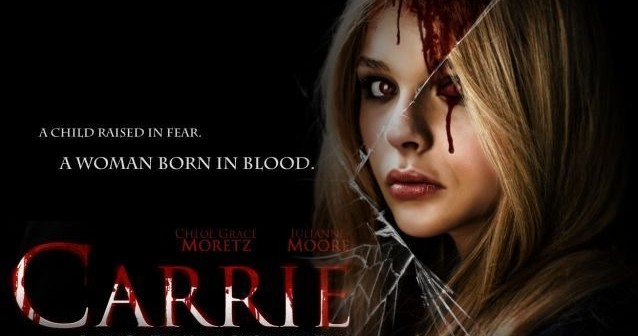“Carrie” was by far the most highly anticipated horror movie of the year. The film is based on the original 1976 film, which in turn was based on Stephen King’s 1974 novel of the same name. “Carrie” tells the story of a young girl named Carrie White who is thrown from her sheltered home life into the hectic halls of public high school. Carrie is woefully unprepared for the cruelties of modern high school or the technological bullying that goes on. Although the 2013 remake has a contemporary setting and uses the latest technology to bring the story up to date, it still features the hallmark scenes and qualities that made the original film a cult classic.
Horror audiences have been gripped by the image of Carrie in her blood-soaked prom dress for decades, and so far, no other film has been able to top that shocking imagery. The modern remake promises to do justice to the iconic prom of the original “Carrie” while simultaneously bringing its own take to the story. While “Carrie” is not a particularly violent film, it is nonetheless suspenseful and terrifying. Chloe Grace Moretz has been chosen to fill the shoes of Carrie White, and fans of the original film couldn’t be happier. While Moretz has the doe-eyed look necessary to portray Carrie’s innocence, she is no novice to the world of acting. The young actress may only be sixteen years old, but she has an acting resume that could rival those of actors twice her age. Moretz has starred in such dark horror comedies as “Dark Shadows” and “Let Me In,” so she knows how to portray not only the damsel in distress but the villain lurking behind the corner as well.
Julianne Moore stars alongside Moretz as Margaret White, Carrie’s mentally ill and fanatically religious mother. Margaret is overprotective of her daughter to the point of causing her harm, and she believes that anything supernatural is the work of the devil. This belief stirs tension between mother and daughter as Carrie’s latent psychic abilities begin to come to the surface with puberty. Margaret is forced to send Carrie to public school, but she doesn’t have to like it, and she warns her daughter against the evil influences she feels are walking the halls. Unfortunately for Carrie, her new school holds threats that her sheltered upbringing could never have prepared her for. She is instantly seen by her classmates as an outcast, and she quickly becomes the target of cruel bullying. Unlike in the original film, Carrie’s modern classmates have access to a bevy of technological instruments they use to make her life a nightmare.
Right before Carrie is pushed to the brink, a classmate intervenes with a selfless decision to let her boyfriend take Carrie to the prom. What begins as a night to remember ends as a bloody night of chaos that no one in their small town will ever forget. The original “Carrie” uses subtle performances and understated effects to create a chilling atmosphere that lasts throughout the entire film, even during its lighter moments. The modern “Carrie” follows in those footsteps, using tasteful and subtle special effects to create a world of terror that is both realistic and bizarre. “Carrie” is, at its core, a psychological thriller. While other films succeed on cheap thrills and jump scares, the horror in “Carrie” is far more nuanced and sophisticated.
As with all films based on Stephen King’s novels, “Carrie” has a sizable following. Thanks to the success of the original film and its iconic status in horror movie history, the 2013 “Carrie” has high expectations to live up to. Fortunately, director Kimberly Peirce is more than up to the task. She has directed such iconic films as “Boys Don’t Cry” and “Stop-Loss,” earning her a place as one of the most respected and innovative directors of her time.
In a time when exaggerated computer-generated special effects and over-the-top characters reign supreme in the horror genre, it’s no surprise that an understated film such as “Carrie” would be a breath of fresh air. The original film still captures the imagination of horror audiences and continues to receive adoration from fans and critics alike. The modern “Carrie” is filled with the same subtle undertones and themes of growing up, bullying, and coming to terms with being different. While “Carrie” undoubtedly meets all the qualifications for modern horror, the film is much more underneath. “Carrie” is a story about coming of age and learning to navigate the cold realities of the adult world, making the 2013 remake a modern update of a timeless tale.

